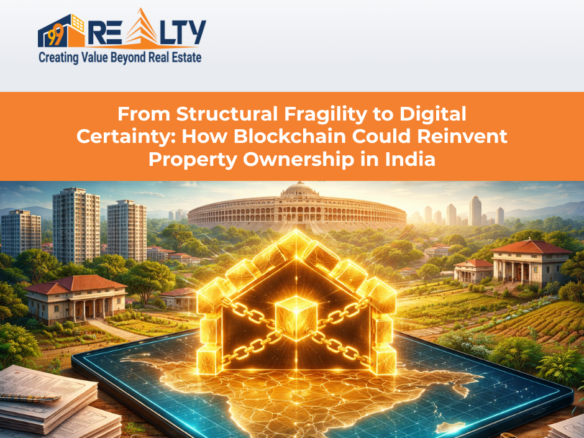Ever walked into a lobby and found yourself wondering why the elevator still takes ages, the lights flicker, or the security check takes too long? Now imagine a building where the lighting adjusts based on your presence, the elevator zones are optimised, and your maintenance request is handled instantly via an app. That’s the change the prop-tech wave brings to real estate. And it matters like never before. The very article from The Hindu titled “Proptech reshapes real estate” points to intelligent buildings and smart vertical mobility as game-changers in the Indian context.
Property has always been about bricks and land, but now it’s just as much about data, connectivity and experience. If you’re part of the ecosystem — as a buyer, tenant, investor, developer or manager — ignoring this shift is no longer an option.
Unlock Smart Urban Living: The Rise of 2.5 BHK
What is PropTech? Defining the Landscape
PropTech is shorthand for “property technology” — the intersection of real estate and digital innovation. Simply put, it’s applying tech tools to the longstanding domain of buying, selling, managing and living in spaces. According to one authoritative source: “PropTech … refers to the innovative application of technology to streamline and enhance real estate processes.
It’s not just about slick mobile apps. It’s about rethinking how a building is conceived, operated and experienced. From virtual property tours to data-driven pricing, from sensors everywhere to blockchain-backed ownership records — that’s PropTech in action.
Historical Context: Real Estate Before the Tech Wave
Let’s rewind a bit. Traditional real estate has long been slow-moving, paperwork-heavy, dependent on physical visits, and often opaque. A buyer visits multiple sites, negotiates with developers or brokers, scans printed brochures, and hopes they’ve found the right place. For developers and managers, operations were manual, maintenance reactive, margins squeezed, data minimal.
So when we talk about “reshaping real estate,” we’re really talking about shaking loose these decades-old patterns. The real estate industry is waking up and saying: “We can do this better.”
Demystifying Maintenance Charges on Flats: What Every Homebuyer Should Know
Key Technologies Driving PropTech
Artificial Intelligence & Big Data
AI and big data are the engines driving smart decision-making. Algorithms can crunch years of transaction data, rental trends, demographic shifts and even social media signals to predict where the next hot locality will be. In India, some firms are using analytics to help investors and developers make informed bets.
Internet of Things (IoT) and Smart Buildings
IoT means sensors everywhere — temperature, motion, humidity, energy use, security access. Smart buildings respond. Hey, you’re home — lights turn on, elevator is summoned, heating kicks in. And over time, patterns show where energy is wasted, where elevators idle, where maintenance is needed proactively. That’s what “intelligent buildings and smart vertical mobility” refer to in the Hindu piece.
Blockchain, Digital Contracts & Tokenisation
Think of buying a property with less paperwork, more transparency, fewer intermediaries. Blockchain and smart contracts promise that. Tokenisation opens up fractional ownership (one day maybe your aunt can own 5 % of a high-rise instead of sitting out). These are emerging but potent.
How PropTech is Reshaping Real Estate in India
The “reshaping” isn’t theoretical — it’s happening.
Intelligent Buildings and Smart Vertical Mobility
In dense Indian cities verticality is unavoidable. The Hindu’s article emphasises that “smart vertical mobility” — meaning faster, optimised elevator systems, smart traffic flow inside buildings — is changing how Indians live, work and experience space.
Enhanced Buyer & Tenant Experience
From virtual tours to automated property matching, technology is reducing friction. Buyers spend less time scanning listings that don’t fit, tenants find communities that align with their lifestyle. Platforms in India are already using AI to match users to properties.
Operational Efficiency for Developers and Managers
For the folks running the buildings, the game is shifting from reactive (“Uh oh, the AC broke again”) to proactive (“Sensor flagged AC unit #12 will fail in 3 days — let’s fix it now”). Cost savings, better maintenance, happier residents: that’s a win-win.
Challenges and Hurdles in Adoption
Legacy systems and resistance to change
Old habits die hard. Real-estate is traditionally conservative. Many developers are used to spreadsheets and physical records. Changing that means cost, mindset, training — and not everyone is willing.
Data security, privacy, and regulatory issues
Sensors in your home, your usage data, digital contracts — these raise trust issues. Who owns the data? How secure is it? Are regulations there? The answer: still under development in many markets.
Talent gap and skills for tech-enabled real estate
You need people who understand both real estate and tech. How many legacy developers have data scientists on staff? Not many. Bridging that gap is essential but takes time and investment.
The Role of Start-ups and New Business Models
Platform businesses, marketplaces and proptech unicorns
In India we’ve seen platforms such as NoBroker (broker-free marketplace) become unicorns. These aren’t just listing sites — they integrate tech, data, services. Property-management, marketplace, subscription: the models are shifting.
Subscription-based services and asset management models
Instead of “build it, sell it, move on”, some developers are adopting “build it, operate it, service it”. Think of recurring income, tenants as customers, amenity platforms, IoT as service. PropTech enables this.
The Impact on Investors, Developers and End-Users
For investors: data-driven decisions and ROI modelling
If you invest in real-estate today, you’re wise to ask: How tech-ready is the building? Is there predictive maintenance? Will the value rise because the property is smart? PropTech gives new levers for return.
For developers: smarter design, cost efficiency, faster launch
Design upfront with sensors and connectivity in mind. Smart vertical mobility reduces wait times, enhances value. IoT and data cut operating costs. Launch faster, manage smarter.
For end-users (buyers/tenants): transparency and convenience
From online contract signing to app-based facilities, from energy usage dashboards to building-wide analytics — living in a smart building means being part of the experience, not just a tenant.
Explore the Benefits of Green Building Certifications in Real Estate
Sustainability and Smart Cities: The Bigger Picture
Green buildings, energy-efficiency and IoT synergy
Tech + sustainability = match made in heaven. Sensor-driven energy use, smart HVAC, lighting automation — proptech can help buildings hit green targets (and reduce bills). It aligns with the larger smart-city vision.
Urban mobility, vertical transport and mixed-use planning
Smart vertical mobility isn’t just elevators; it’s how people move in tightly packed spaces, how mixed-use towers integrate offices, homes, retail, how transport and building design merge. PropTech plays a big part.
What the Future Holds: Trends to Watch
Augmented Reality (AR), Virtual Reality (VR) for property tours
Imagine standing in Ranchi, wearing AR goggles, touring a high-rise in Bengaluru. That’s coming. Buyers will “experience” before committing.
Digital Twins and 5G connectivity
A digital twin is a virtual replica of a building, fed by real-time data. Manage it, optimise it, simulate failures, plan maintenance. And 5G enables huge sensor networks to make this possible.
Fractional ownership, tokenisation and global investments
Tokenisation enables you to buy 1/100ths of a high-value property in Mumbai and trade it like a stock. That changes the investment paradigm entirely.
How Stakeholders Should Prepare
Developers & property managers: embrace analytics and IoT
Don’t wait. Start small: pilot sensors in common areas, get usage data, optimise lighting. Then scale. Make sure your team is trained. Align your budget.
Investors: upgrade capabilities and adopt continuous learning
Ask about promised tech-features, evaluate operating models, factor in long-term service costs. Learn the jargon so you’re not relying solely on the broker.
Buyers/tenants: demands are rising – know your rights & tools
If you’re renting or buying, ask if the property has smart features, what data you can see, what operational transparency exists. Don’t just settle because it looks pretty.
India-Specific Considerations and Local Nuances
Regulatory environment and real-estate reforms
India’s regulatory environment is evolving: RERA, real-estate reforms, digital property records. PropTech needs to align with policy. Developers must navigate compliance while innovating.
Urban vs semi-urban real-estate adoption of PropTech
In mega-cities like Bengaluru, Mumbai or Delhi, proptech is advancing fast. But in smaller cities or semi-urban areas, adoption is slower — infrastructure, connectivity and capital may lag. Yet opportunity lies here.
Cultural and behavioural factors in Indian property market
Trust in brokers, physical presence of buyers, preference for face-to-face interactions — these are still strong in India. PropTech must respect culture even as it transforms process.
Building Your Own PropTech Strategy
Step-by-step roadmap for smaller developers or property managers
- Define your tech ambition: basic (sensors + dashboard) vs advanced (AI + digital twin).
- Pick pilot area: e.g., smart lighting & elevator wait-time measurement.
- Gather data, analyse, report.
- Expand across building, integrate building-management system.
- Offer added services (tenant portal, maintenance analytics).
Budgeting, partnership and pilot projects
Budget for hardware (sensors), software, training, change-management. Partner with a proptech vendor rather than reinventing the wheel. Run a pilot, evaluate ROI before full roll-out.
Measuring success: metrics you must track
- Energy savings (kWh reduction)
- Elevator wait-time improvement
- Tenant satisfaction scores
- Operational cost per square foot
- Lead-to-lease or sell conversion improvements
Conclusion: Embracing the PropTech Revolution
So there you have it — the era of proptech isn’t some far-off fancy: it’s here, and it’s changing how we build, buy, sell, manage and live in properties. The article in The Hindu shines a spotlight on India’s own transformation with intelligent buildings and smart vertical mobility, but the ripple effect is much deeper. If you’re part of the ecosystem — whether as investor, developer, manager or resident — the call is simple: adapt or be left behind. Technology isn’t just adding frills; it’s rewriting the rules of real estate.
As you navigate your next property decision, ask yourself: Does this building think? Does this space respond? Does the investment leverage data and systems, or just land and walls? If you answer yes, you’re stepping into the future. The future of real estate is smart, connected and efficient — and it’s already knocking.
FAQs
Q1: What exactly qualifies as “PropTech”?
PropTech is any technology applied to the real-estate value chain — from listing through to occupancy and management. That covers AI, blockchain, IoT, VR tours, digital marketplaces, smart building systems, etc.
Q2: How can a small developer benefit from PropTech without enormous budgets?
Start small: pick a pilot such as smart lighting or IoT sensors in common areas. Monitor data and demonstrate cost savings. Then gradually scale. Partnerships with tech vendors help reduce upfront cost.
Q3: Are there risks associated with PropTech in real estate?
Yes — data privacy, cybersecurity, tech obsolescence, regulatory compliance, integration issues with legacy systems. Because real estate is a long-term asset, tech choices must be future-proof.
Q4: How does PropTech impact the value of a property for a buyer or investor?
Smart readiness and tech features can improve tenant satisfaction (hence higher rents), reduce operational cost (hence higher net yield), enhance design and branding (hence higher resale). These factors can raise valuation.
Need Help?
Need help evaluating a property or planning your next move in the market?
Reach out to 99 REALTY – your trusted real estate partner for smarter choices.
Subscribe to get updates on our latest posts and market trends.






Join The Discussion